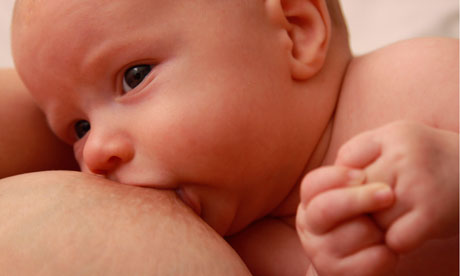
This National Breastfeeding Awareness Week all I want to do is stop talking about breastfeeding, shut up the milk bar and take an interest in something more purposeful, like terrariums or Pinterest.
As a doula, who supports families during and after childbirth, and co-chair of Birthrights, a charity that promotes women's rights around birth and breastfeeding, I am someone who might be considered to have "lactivist" sympathies. So, I should be out on the high street juggling my knitted demonstration breasts. Yet, while I celebrate the magical biology of breastmilk, I've finally been affected by a top-down apathy that's scuppering women's attempts to get the stuff into their babies.
I'm sick of breastfeeding. Or rather, sick of reading pieces about "breastfeeding nazis".
In 2011, the Department of Health withdrew funding for Breastfeeding Week. England no longer has a national breastfeeding strategy; the DH's committee on breastfeeding no longer meets; and, surprise, surprise, the number of women attempting to breastfeed has fallen for the first time in a decade. A Unicef report suggests that even moderate increases in breastfeeding could save the NHS £40m and dramatically reduce instances of some serious and fatal illnesses in babies.
The dichotomy is too much for some, with one breastfeeding counsellor (who didn't wish to be named) saying she feels "cynical" about the seven days of supposed breastfeeding promotion without funding to give practical help to mothers. Emma Pickett of the Association of Breastfeeding Mothers believes that "breastfeeding week has become silly season for the media. The powerful message is one of polarisation. There are apparently mothers increasingly finding breastfeeding 'abnormal' and a bunch of other women who are [being labelled as] single-minded 'breastapo'."
Is this reflective of our society? Pickett thinks not. "The vast majority of new mothers want to breastfeed. They sometimes struggle to find support and are sad and angry when it doesn't work out," she says. "Some women choose to use formula but we're all on the same side. Womanly co-operation isn't as zesty as the stories of conflict."
New mums want to do it. They've heard it's best for the baby, but they have also heard that it is torturous. Many of their friends tried and couldn't. They believe they will be judged whatever they do. It's a toxic cocktail of expectations and disappointment, which is entirely avoidable by providing accurate information, accessible support and adequate midwife provision. When women come to breastfeed for the first time, they ask to be shown how to feed, or how to hand express, but no one with experience has time to assist. The babies cry and cry and a few hours later the maternity care assistant asks if she can take the babies off for a bottle so the mothers can rest. Game over.
Jacque Gerrard, the director for England of the Royal College of Midwives, says: "We need more midwives, especially in the community setting, but they do go that extra mile to support women and it shouldn't all be down to them. We need to work collaboratively with breastfeeding organisations and communities to give babies the best start."
For me, if policymakers aren't funding enough midwives or a centralised system of breastfeeding support we simply set women up to fail. We wonder why postnatal depression rates are so high and watch as the hurt plays out in the media caricatured as a "cat fight". The only winners are the formula companies, whose £16bn worldwide market swells in response.
Without central funding for breastfeeding support we are promoting a wonder drug this week, but keeping the medicine cabinet tightly locked.

